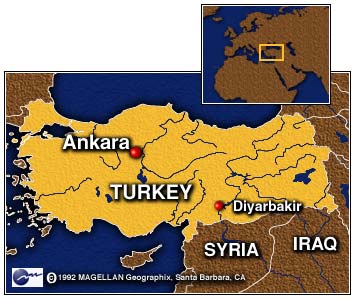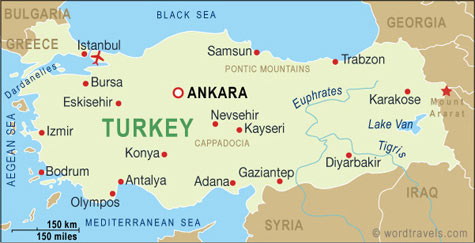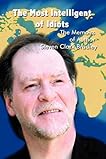
Have you ever been in a situation when you knew it would be a once-in-a-lifetime opportunity, but it posed great risk to your very life? That is exactly what I was facing in August of 1991 when I looked at the huge Kharbour River bridge that lay out ahead of me. Take a look at my excerpt from my memoirs, The Most Intelligent of Idiots. It will stir your emotions...
A Bridge To Cross
“There are two ways to enslave a people. People do not give up their Freedom. They naturally take it for granted. The search for Freedom has always been the driving force that has risen bowed down and beaten men and women up from the ashes and transformed them into warriors of their people. It is the final understanding that no person can make me free, but the realization that I am altogether and utterly free, such liberty having been breathed into the nostrils of the first man and woman by God.”
Steven Clark Bradley
A Bridge To Cross
The Most Intelligent of Idiots
The Memoirs of
Author Steven Clark Bradley
Ankara, Turkey
July 23, 1991
Thank Goodness for the Guney Express.
 The word ‘express’ truly was a misnomer for this train. The Guney Express, which I boarded on July 23rd, took me all the way to the Eastern border of Turkey in a rapid time of four days. It was not that I boarded the wrong train but rather that I choose this train for a journey that gave me a tremendous look at the culture of Turkey, from the modern center of the country to the rustic and tough Eastern portion.
The word ‘express’ truly was a misnomer for this train. The Guney Express, which I boarded on July 23rd, took me all the way to the Eastern border of Turkey in a rapid time of four days. It was not that I boarded the wrong train but rather that I choose this train for a journey that gave me a tremendous look at the culture of Turkey, from the modern center of the country to the rustic and tough Eastern portion. I felt many eyes on me; the foreigner seldom seen on such archaic forms of travel as the slowest train in the Turkish rail system. By the time I arrived in Diyarbakir, the capitol of the east and the unofficial capitol of Kurdistan, I had seen the fields being prepared for harvest, the towns that were continually rattled by sand storms and a people rough and hardened by a life that is mean and laborious. Nevertheless, I could not but respect these people for their determination to ilk out a very good life in the sand of a moderately desert lifestyle.
I felt many eyes on me; the foreigner seldom seen on such archaic forms of travel as the slowest train in the Turkish rail system. By the time I arrived in Diyarbakir, the capitol of the east and the unofficial capitol of Kurdistan, I had seen the fields being prepared for harvest, the towns that were continually rattled by sand storms and a people rough and hardened by a life that is mean and laborious. Nevertheless, I could not but respect these people for their determination to ilk out a very good life in the sand of a moderately desert lifestyle. Diyarbakir, Turkey
Train Station
3:15 p.m. July 27, 1991
 Diyarbakir’s appearance was nothing short of a page out of some spaghetti western. It is a rugged city with teeming groups of nomadic tribesmen from the Kurdish population. The train station was more like a stable, and as I ventured out to the streets to take a bus to the border with Iraq, I felt like a sore on the end of someone’s nose. I boarded a minibus for the border town of Silopi. The trip was astounding. The periodic police stops, and the road that ran along the Syrian border, created a tense situation as outposts were set up from both sides about every 100 yards. It was easy to see guns trained on each side.
Diyarbakir’s appearance was nothing short of a page out of some spaghetti western. It is a rugged city with teeming groups of nomadic tribesmen from the Kurdish population. The train station was more like a stable, and as I ventured out to the streets to take a bus to the border with Iraq, I felt like a sore on the end of someone’s nose. I boarded a minibus for the border town of Silopi. The trip was astounding. The periodic police stops, and the road that ran along the Syrian border, created a tense situation as outposts were set up from both sides about every 100 yards. It was easy to see guns trained on each side. Normally, the lines of loud smoky trucks would be at a standstill, as they waited their turns to hopefully pass through customs and get security clearance. Sometimes, the line could back up the trade traffic a few dozen kilometers between the two very different countries. When I was there, the traffic flowed unabated because, as I would discover the next day, the border was totally unmanned with no security in place on the Turkish side of the Khabur and the trucks passed back and forth unimpeded.
Normally, the lines of loud smoky trucks would be at a standstill, as they waited their turns to hopefully pass through customs and get security clearance. Sometimes, the line could back up the trade traffic a few dozen kilometers between the two very different countries. When I was there, the traffic flowed unabated because, as I would discover the next day, the border was totally unmanned with no security in place on the Turkish side of the Khabur and the trucks passed back and forth unimpeded.I got out of the van and went into a bus depot and heard someone on a pay phone speaking English. He was a reporter, I surmised, and I actually never spoke to him. I just intently listened to what he was saying to the person on the other end of the line, wherever that could have been. He was screaming into the receiver that his superiors had to get him out of there and that ‘They’ were killing Americans.
 He told them that he was going to try to get to the US base four kilometers down the same road that had brought me into the seriously out of control population center of helicopters, US jets high in the air and the sounds of gunfire randomly being propelled into the air. I was sure I’d see Clint Eastwood walk into the depot any moment and ask everyone if they felt lucky. That atmosphere seemed perfect for a gunslinger to burst in shooting. It was no use waiting to use the phone. I didn’t have anyone to call. I instantly snatched up my backpack and went back outside to find a taxi all the way to the US military encampment.
He told them that he was going to try to get to the US base four kilometers down the same road that had brought me into the seriously out of control population center of helicopters, US jets high in the air and the sounds of gunfire randomly being propelled into the air. I was sure I’d see Clint Eastwood walk into the depot any moment and ask everyone if they felt lucky. That atmosphere seemed perfect for a gunslinger to burst in shooting. It was no use waiting to use the phone. I didn’t have anyone to call. I instantly snatched up my backpack and went back outside to find a taxi all the way to the US military encampment. As I waited for a taxi to appear, two Iraqi Syrian Christian men started speaking to me in broken English. I knew that the Kurdish people loved the French, because President François Mitterrand had brought so many of them to France to escape the terror of Saddam. So, not being sure of anyone there, I said, “Je suis Français.” They understood and instantly said, “Oh, you are a French man?” I simply said yes, in French. They gave me directions and one of them got a taxi for me and told the man where I wanted to go … I hoped.
As I waited for a taxi to appear, two Iraqi Syrian Christian men started speaking to me in broken English. I knew that the Kurdish people loved the French, because President François Mitterrand had brought so many of them to France to escape the terror of Saddam. So, not being sure of anyone there, I said, “Je suis Français.” They understood and instantly said, “Oh, you are a French man?” I simply said yes, in French. They gave me directions and one of them got a taxi for me and told the man where I wanted to go … I hoped.The driver tried his English on me and it helped me a lot. I was really feeling naked in the taxi as the driver drove me in the dark to where I was told the American Airbase was, at almost 9:00 p.m. Prayer is such a great help in a test or when you wonder if you are about to die. He pulled up to the main entrance of the airbase; I got out and the taxi immediately drove away.
He finally relented and called his superior who had already bedded down for the night. In the end, I was given a hot, smoldering room on a cot right off of the radio room. It was so hot that I slept naked and woke up drenched. At first, it was so hot that I couldn’t sleep at all, but the constant chatter back and forth over the radios in the next room almost hypnotized me and after about an hour, I nodded off.
The next morning turned out to be one to remember. Early in the morning, after a tremendous breakfast, I met with the director of the UN in the town. He informed me that if I entered the country of Iraq and was captured, I would be responsible for myself. That was not delightful to hear, but I had already known that. A military vehicle took me to the Khabur River Bridge. They dropped me in front of the abandoned checkpoint.
I did pause momentarily, but nothing could stop a moment whose time had come. I walked on and felt the weight of entering a land like this one. I had previously visited 31 other countries, but this journey had so far been, by far, the most intriguing. I had made a promise to Hassan, and I intended to let his family know that he was alive and well.
I walked up to one of the guardians of the land of sad, bad memories and black gold and handed him a letter that I had received from my Kurdish friends at the Besh Yildiz Hotel in Ankara, Turkey. The black-bearded relic from the past took the letter and read it before calling over two more officers. One took me by the arm and placed me in the backseat of a taxi. The third guard brought over a thick blanket and covered my exposed body. I was on my way; to live, to die, and to do something significant.
I poked my face out from under the blanket and thoughts began to race through my mind about my childhood, my friends, the ones I love and the previous places I had been to, which had molded who I was, for good or for not so good. This definitely had not been my first trip of this sort. There had been Bangladesh, Pakistan, and Senegal, West Africa.
 It is mystical and powerful how one’s mind goes back in time when we are in dangerous situations. That was exactly what was happening to me as I saw the mountains that were full of snipers, blown up tanks and other Iraqi destroyed materiel. I just wondered just how far back would my mind take me as I took in all that was zooming past me and around me, so much so that I had not even checked to see if the driver were taking me captive or taking me to my desired destination. I could see in my whole life playing out like a mental movie quite possibly because I was sure this would be my last journey into madness.
It is mystical and powerful how one’s mind goes back in time when we are in dangerous situations. That was exactly what was happening to me as I saw the mountains that were full of snipers, blown up tanks and other Iraqi destroyed materiel. I just wondered just how far back would my mind take me as I took in all that was zooming past me and around me, so much so that I had not even checked to see if the driver were taking me captive or taking me to my desired destination. I could see in my whole life playing out like a mental movie quite possibly because I was sure this would be my last journey into madness.The world I had seen and lived in and how it had brought me to that present moment affected me as the world of Saddam and the world I had grown up in both flashed past my mind and I saw all the lives I had touched and those that had made life worth living. It all played back for me so vividly with a view from the backseat and took my mind back to times rarely recalled; times I did great things; moments I was stupid. It all was an essential part for my transformation into the most intelligent of idiots…

Get a copy at:
Amazon.com
Barnes & Noble.com
Goodreads.com


No comments:
Post a Comment